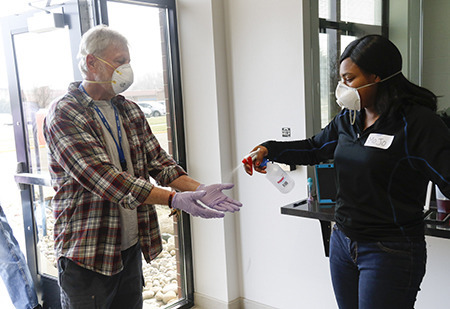Photo via Wisconsin Department of Military Affairs
On the morning of Tuesday, April 7, Wisconsinites learned upon waking that the appeal to postpone their primary election amidst the COVID-19 outbreak was denied by their state court and the Supreme Court. Thousands of citizens proceeded to fashion homemade facemasks to protect themselves and braced for the defunct day of voting.
Tony Evers (D-Wisconsin) who entered office as part of the “blue wave” of 2018’s midterms, called on Republican courts last week to suspend the primary until further notice, citing it as a potential health disaster as COVID-19 cases continue to climb. The Republican-held State Court denied this request, claiming that all of the necessary health precautions were to be integrated into the polling locations in order to ensure the safety of citizens. Wisconsin, like most of the country, has not distributed filtration masks to the mass public.
The Supreme Court supported this decision, welding the power of a 5-4 Republican majority. These Republicans stated that the proposal would “fundamentally alter the nature of the election”. However, a shortage of poll workers slashed the number of polling locations that Wisconsinites could visit. In Milwaukee, a city that is home to about 600,000 citizens, only five polling locations were open, resulting in sprawling lines and congested buildings.
David Daley, a journalist and author whose critical expertise stems from the issues of redistricting and gerrymandering, argues that this is exactly what is at stake for Republicans moving forward in 2021: redistricting. Wisconsin Republicans successfully re-drew district lines in 2011 that allowed for a significant shift in the party’s executive power in a state whose citizens are majority Democrat.
On the other hand, many critics are reminding us this is a state issue at the end of the day, and that state courts ultimately are within their right to allow in-person voting during the time of a pandemic.
The New York Times has since reported that over 9,000 absentee ballots were never even sent to the homes of voters who had officially requested them. The last-minute scramble can serve as an example for other states who plan to move their voting process to mail-in.
At the end of March, President Donald Trump stated in a Fox interview that alternative methods of voting, such as vote-by-mail, are unreliable for proper data collection. He went on to remark that “If you’d ever agree to it, you’d never have a Republican elected in this country again.” Republicans are showing signs of concern that vote-by-mail will drive out liberal turnout, and many are echoing Trump’s claims. Trump continues to stand by these statements, tweeting in support of the in-person voting as recently as Wednesday, the day after the primary took place.
Of the states that have yet to vote, four have announced that they will either include or completely enforce state-wide mail-in voting, Pennsylvania included. The PA primary has been rescheduled to June 2, with the final day to submit all applications being May 26. In light of the COVID-19 outbreak, PA is not requiring that any voter specify a reason for requesting a mail-in ballot, which is the normal policy.
CJ Fudala is a fourth year English major, cf865983@wcupa.edu

